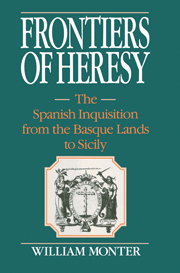Book contents
- Frontmatter
- Contents
- List of maps and figure
- List of tables
- Preface
- PART 1 THE HOLY OFFICE OUTSIDE CASTILE
- PART 2 ARAGONESE TRIBUNALS
- 4 Saragossa: a royal fortress
- 5 Barcelona: Inquisitors with short arms
- 6 Valencia: taming the magnates
- 7 Navarre: the four conspiracies
- 8 Sicily: Italian wine in Spanish bottles
- PART 3 ARAGONESE HERESIES
- PART 4 “MIXED CRIMES” IN ARAGON
- PART 5 RECESSIONAL
- APPENDICES
- Glossary
- Index
- CAMBRIDGE STUDIES IN EARLY MODERN HISTORY
4 - Saragossa: a royal fortress
Published online by Cambridge University Press: 24 October 2009
- Frontmatter
- Contents
- List of maps and figure
- List of tables
- Preface
- PART 1 THE HOLY OFFICE OUTSIDE CASTILE
- PART 2 ARAGONESE TRIBUNALS
- 4 Saragossa: a royal fortress
- 5 Barcelona: Inquisitors with short arms
- 6 Valencia: taming the magnates
- 7 Navarre: the four conspiracies
- 8 Sicily: Italian wine in Spanish bottles
- PART 3 ARAGONESE HERESIES
- PART 4 “MIXED CRIMES” IN ARAGON
- PART 5 RECESSIONAL
- APPENDICES
- Glossary
- Index
- CAMBRIDGE STUDIES IN EARLY MODERN HISTORY
Summary
Ningun nación se aventaja a los Aragoneses en la veneracion y respeto al Santo Oficio; honor de todos es el gloriarse de esto.
Dormer, Anales de Aragón (1697), p. 118.Los señores de vassallos … en este Reyno son tan libres, ya que tienen oprimidos los Juezes reales y ecclesiasticos, querrian si pudiessen hazer lo mismo de los Inquisidores.
Inq., Libro 962, fol. 127 (1565).En esta tierra no se teme al Rey, en cuyo beneficio actuamos, y se teme a la Inquisición.
Saragossa to Suprema, 1550 (quoted by Contreras, in Hispania Sacra, 37 [1985], p. 507).V. M. sea servido de tener cuenta con la auctoridad deste Oficio y lo mucha que importa el conserbarlo, no solo para los negocios de la fe, pero aun para servicio de V. M.
To Suprema, 1560 (quoted by Carrasco Urgoiti, El problema morisco en Aragón, pp. 118–19).The most famous event in the history of the Inquisition of Saragossa – the murder of Inquisitor Pedro Arbués in 1485 – had several important results. As Aragon's greatest sixteenth-century historian noted, “Our Lord allowed, when they thought to extinguish this Holy Office, that … it was introduced with all the necessary vigor and authority.” Perhaps the most significant consequence of Arbués' death was not the bloody repression of Aragon's conversos (many more Judaizers died at Valencia than at Saragossa during the next fifty years), but rather a little-noted decree of King Ferdinand in December 1485.
- Type
- Chapter
- Information
- Frontiers of HeresyThe Spanish Inquisition from the Basque Lands to Sicily, pp. 79 - 104Publisher: Cambridge University PressPrint publication year: 1990



